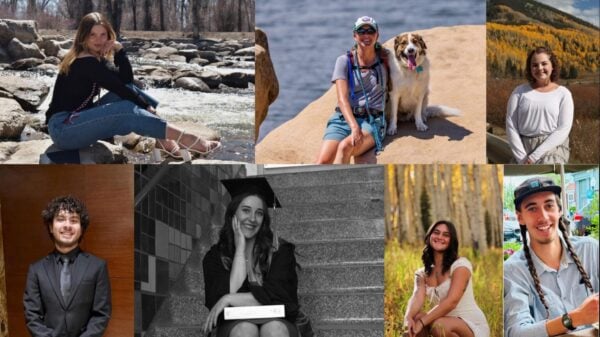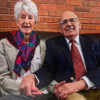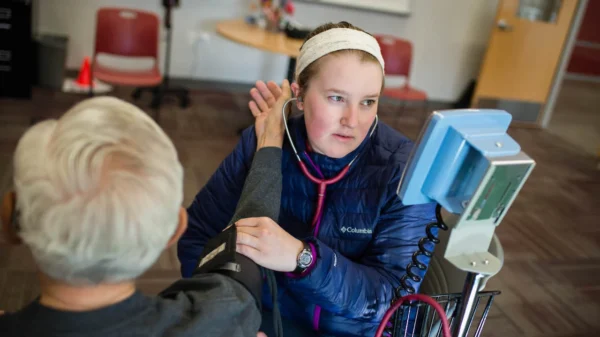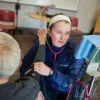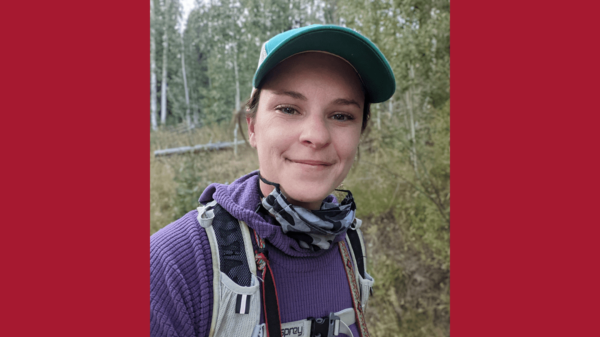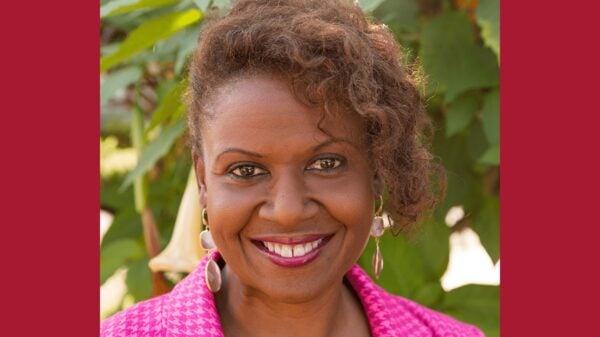Western’s Adult Degree Completion program is giving non-traditional students with unfinished business
Of the nearly 500 students who walked across the commencement stage at Western Colorado University this spring, Brad Williamson stood out. In a sea of young faces ready to take on the world, his face was a bit more weathered than most. He had already seen so much of what still lay ahead of the others.
As Williamson walked onto the stage, the simple reading of first and last names stopped so Professor Terry Schliesman could catch his breath. His next announcement would be a long one. “And adult degree completion student from 1987 to 2023, Bradley Rex Williamson Senior,” he shouted, like an MC announcing an act. The crowd cheered, and Williamson took his diploma and gave a quick bow. For him, that was a moment 35 years in the making.
Williamson first arrived at Western on the recommendation of his cousin in 1987 to study communications, with an emphasis in theater. He had what would prove to be a valuable experience in Gunnison, acting and learning to use stage lighting, working in the radio station, budgeting for and ordering equipment. But five years later, he left town and headed for Ohio, almost a full year short of finishing his degree.
He tried his hand at acting, earning spots as a victim on Unsolved Mysteries and the guard who let Morgan Freeman out of prison in The Shawshank Redemption. He thought it might be enough to get his foot in the door in Orlando, where some college buddies were living near Universal Studios. It wasn’t, so he went down a different path, working as a laborer helping build Bonkerz Comedy Club. That gig led to a job as a DJ and being the house MC at the club, which led to another job and another. Eventually, he landed at Universal Studios at the bottom of a corporate ladder that he started to climb. Soon, his time at Western was a footnote, and his ambition to get a diploma was a distant memory. Life had moved on.
“My dad always wanted me to get my degree,” he said. “Every few years, he’d ask if I ever thought about contacting Western and finishing. But as far as I was concerned, it was a semester and a half of classes that I would have to do.” That was just too much to ask of a guy with a comfortable office job and a family that included a son who had pressing medical needs. He just didn’t have the time to worry about his degree. Or so he thought.

A troubling trajectory
Before graduating, Williamson was just one of the more than 40.4 million Americans who have earned some college credits without receiving a degree, the so-called Some Credit, No Credential (SCNC) population that keeps growing. According to a report from the non-profit National Student Clearinghouse Research Center, in the last year alone, the number of students who left college before earning a degree rose by more than 18,000. Many of those students never return to complete their degrees. But increasingly, colleges and universities around the country are offering programming designed to bring those students back into the academic fold and help them find a path to degree completion.
When Western professors Terry Schliesman and Jack Lucido first heard from Williamson in 2016 about what it would take to finish his degree, they were only a year into formalizing what was then just an idea. They still had to develop a plan, find funding, and drum up interest from prospective students in what would become Western’s Adult Degree Completion Program. Williamson would be one of their first.
An early development for the ADC program was the awarding of Colorado Opportunity Scholarship Initiative (COSI) funding in November 2021. Western then received a Back to Work grant, as well as a Finish What You Started grant, totaling nearly $800,000 for degree completion and workforce advancement in the COVID recovery era.
Those funds are essential for direct student support or scholarships, student advising, and the overall early stability of ADC. “In essence, it was – and still is – vital seed money that COSI, Governor Jared Polis, and the Colorado Legislature made available at the right time and under the right conditions,” Schliesman said. Because there’s so much support for a program the state sees as vital to filling jobs, like teaching, essential for a successful economy, the typical ADC student sees a 30 to 35 percent reduction in tuition and fees with a COSI scholarship.
Nearly three years in, enrollment in the ADC program has grown from just a few students in its first year to 55 students enrolled in 2022-23. Williamson was one of five students to graduate from the program this year, and it’s expected that at least 15 will graduate in spring 2024. “We’re already approaching half of the size of the entire program coming in the fall. So, we’re seeing significant growth,” Schliesman said. “While Western has a very successful and proud history serving Colorado as a residential university in the amazing Gunnison Valley, we also have a stake in the future of what formal education is becoming in society. Strategically, that is one reason why ADC matters.”
More than just a piece of paper
A college degree isn’t a panacea, but earning one is still a major predictor of life satisfaction. According to the U.S. General Social Surveys, people with a college degree, whether a bachelor’s degree or a graduate degree, were more likely to report being happy or very happy than people with a high school diploma. They also tended to live longer, healthier lives. For a lot of people, a degree means a greater sense of accomplishment, new opportunities for career advancement, and with it, more income.
Perhaps even more important to well-being than the size of a person’s salary is the sense of purpose they carry into their daily lives. A 2019 study in The Journal of the American Medical Association found that people reporting the greatest life purpose were those who worked or volunteered in a field where they felt they were making a positive difference in the lives of others, or they were people who had goals they were working to achieve.
Since she was a little girl, Nancy Walpole knew that her purpose in life was to be a teacher. She loved kids and dreamed of standing at the front of her own classroom. But after two years of college, she decided to step away from school to get married, start a family and raise her children. It wasn’t until all three were in school that she considered returning to pursue her passion for education.
“I always knew that at some point, I would go back to school and finish the degree that I always wanted,” she said. “I got an email about the ADC program from the school district where I have been working as a paraprofessional for the last eight years, and I saw that [Western] had a program for paras to get their teaching degree.”
She was working full-time and taking care of her family. But Walpole already had 30 credits from her earlier college experience, and with classes that were online and a self-paced curriculum, she could make it work. Of course, time management is a challenge with all she has going on. “When I start to feel overwhelmed, I think about the end goal,” she said. “I picture myself teaching in my own classroom and how that dream I have had since I was a little girl can finally be mine.”
During her time in the ADC program, earning her degree in General Education with Colorado Licensure with a certification in Special Education, Walpole has spoken with several of her classmates, and most share the same concerns: they’re too old, there isn’t enough time.
“I know that was a concern for me in the beginning,” Walpole said. “However, I have come to appreciate that there are more of us than I ever realized, and I am really grateful to be a part of the ADC Program. You are never too old to learn, and it’s never too late to make your dreams come true.”
To learn more about ADC, please visit www.western.edu/adc.









